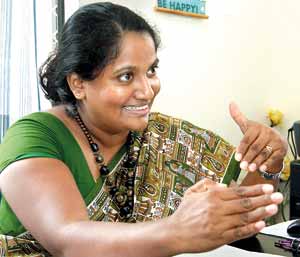Speech and language disorders are a common, yet often maligned problem in society. When a child has difficulty communicating, parents will often put it down to age and let it be. Some children get over it with time, but for some, the problem is one for a lifetime. We spoke to Jayamalie Rupasinghe-Jayasinghe, a Speech Language Therapist at the National Hospital in Colombo about this rising issue.
She defines speech disorders as a communication disorder where ‘normal’ speech is interrupted. These can come in several forms, including Speech delay, dysfluency (stuttering/stammering), cluttering (speaking too fast), muteness (complete inability to speak), speech sound disorders, voice disorders, Dysprososdy (a neurological speech disorder), etc. Language disorders are defined as when a person has trouble understanding others or sharing ideas, thoughts and feelings completely.
 |
| Jayamalie Rupasinghe-Jayasinghe. Pic by Indika Handuwala |
“Speech disorder is an articulation problem in communication and language disorder is a brain coordination problem, of understanding or expression,” says Jayamalie. For example, when a child is given a cup and told it is a cup, if he cannot identify it as a cup still it is a language difficulty. If he understands it is a cup, but has trouble saying the word ‘cup’ , then that is a speech difficulty.
Causes behind both speech and language disorders can be simply defined as speech delays, speech and language delays, pronunciation difficulties, learning difficulties, reading and writing difficulties (dyslexia), voice difficulties, hearing impairments, cleft lip and palate problems, dysfluency, nerve disorders, swallowing and feeding problems, and physical disabilities.
In Sri Lanka, disfluency remains the most typical type of speech disorder, says Jayamalie. Children who are diagnosed with this aged 3-6 can be easily treated, she adds, saying that often therapists direct treatment at the parents to adjust their way of speaking. Parents are advised to stick to one language of communication at home, as bilingualism can often confuse little children and lead to speech disorders.
There are very few speech therapists in the island, we are told. There are about 20 speech therapy units in Government hospitals - Colombo(North Colombo /South Colombo/ LRH, National Hospital ), Kandy, Ragama, Ratnapura, Peradeniya, Kurunegala, Karapitiya and Matara, Anuradhapura, Vavuniya, Badulla, Kurunegala, Karapitiya and Matara. Speech therapists will first take a case history with relation to the patient, carry out an assessment along with a speech and language diagnosis and then carry out an intervention with a therapy plan and goals. Intervention will include advice, demonstration, play and teaching, and this will be followed up with a review and re assessment.
“I believe rapidly declining social interaction is the reason behind the steadily climbing rate of speech disorders,” Jayamalie explains. “Parents, especially, must spend more time in contact with their children and ensure they spend less time in front of the television and computer and more time outside, building relationships and engaging in communication.” |
